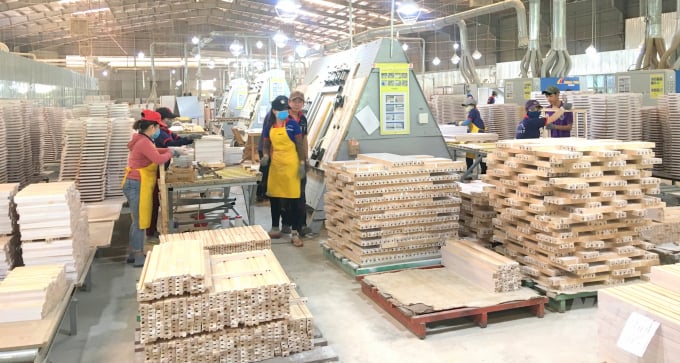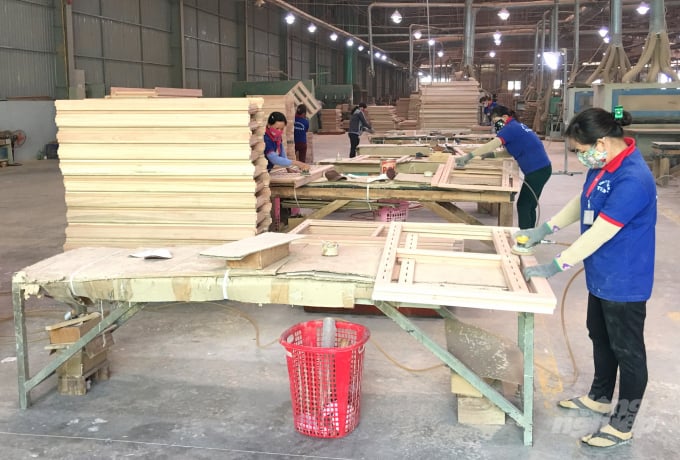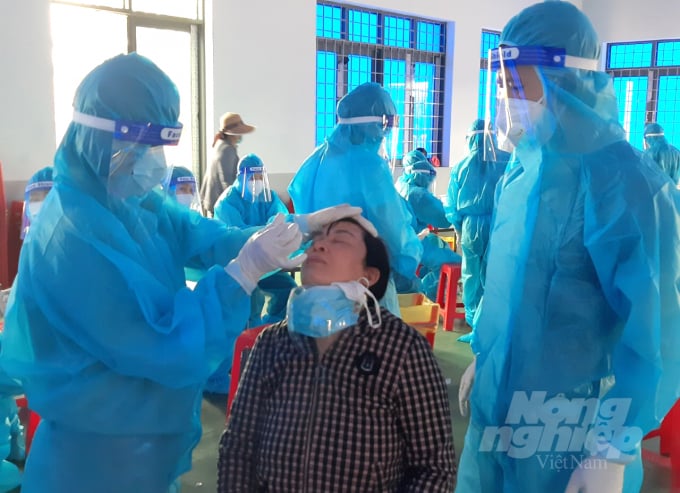June 19, 2025 | 18:33 GMT +7
June 19, 2025 | 18:33 GMT +7
Hotline: 0913.378.918
June 19, 2025 | 18:33 GMT +7
Hotline: 0913.378.918
Exporting wood products is always a leading economic sector in terms of turnover in the central province of Binh Dinh. In 2020, despite difficulties caused by the COVID-19 pandemic, Binh Dinh gained US$ 540 million from exporting wood products, accounting for 51% of the province’s total export turnover.
Since April this year, the COVID-19 pandemic has developed complicated in the province.
However, according to Binh Dinh Provincial Department of Statistics, in the first eight months of 2021, the province's export of wood and furniture products still reached about $470.7 million, accounting for about 53.9% of the total export turnover.

Only companies in Quy Nhon City could maintain production with 60-70 per cent of total workers going to work. Photo: Vu Dinh Thung.
Le Minh Thien, president of Binh Dinh Forest Products Association, said that until August 2021, the association had 89 members that were operating in nine out of 11 districts, towns and cities in the province, creating stable jobs for more than 25,000 people and contributing to the local socio-economic development.
However, in the last few months, almost all the wood processing companies in the province suffered from stagnant production due to a serious shortage of labour – a result of strict and inflexible measures in human management during the pandemic.
Only companies in Quy Nhon City could maintain production with 60-70 per cent of the labour force while those in Phu Cat District had to suspended production because of labour shortage.
Although communes and towns in Phu Cat District stopped social distancing measures under Government’s Directive 16, local authorities still imposed a travel ban that prevented workers from going to work.
A similar situation is seen in An Nhon Town and other parts of Binh Dinh Province.

Almost all wood processing companies in Binh Dinh Province are facing a serious shortage of labour.Photo: Vu Dinh Thung.
Binh Dinh Forest Products Association discussed with local authorities in areas where Directive 15 with loosened social distancing measures is implemented over the workers’ backing to work, Thien said.
“However, until now, the problem has not been solved,” he said.
“Almost all localities are concentrated too much on COVID-19 prevention and control. They seemingly forget the twin goals – COVID-19 prevention and control and economic development,” Thien said, adding that when people had no jobs, no incomes for a long time, it was likely for social instability to appear.
From now to early next year, wood processing companies had export contracts to complete. If they failed to deliver products as committed, they would have to compensate their partners, Thien said.
Due to labour shortage, in the last two months, the volume of wood products for exports declined sharply, Thien said, adding that if the labour problems could not be solved soon, the export volume would continue to fall seriously.
Meanwhile, US and European markets have been recovering from the pandemic, possibly having a higher demand for wood products.
Nguyen Phi Long, chairman of Binh Dinh Province People’s Committee has asked the province’s Health Department and other relevant agencies to review and together solve the labour problem for wood processing companies.
“The problem must be solved as soon as possible to help the wood sector ensure production and catch trade opportunities at this time,” Long said.

Binh Dinh Forest Products Association recommends that companies should be allowed to decide specific groups of workers to test for SARS-CoV-2 instead of mass testing to avoid waste. Photo: Vu Dinh Thung.
President of Binh Dinh Forest Products Association Thien said that companies complained over the SARS-CoV-2 testing for workers.
“Companies have to pay much for the testing but it is unreasonable and inefficient,” Thien said.
According to the local health authority, companies in COVID-19-free areas had to have at least 20-25 per cent of their total workers tested while they applied the three-on-site model in which workers did not leave workplaces after work.
“The testing regulation is not suitable in the current situation. Now, companies should be allowed to decide specific groups of workers to test instead of mass testing,” Thien said.
Translated by Hien Anh
/2025/06/17/3942-2-143243_548.jpg)
(VAN) Recently, in Sweden, the Secretary of the Binh Dinh Provincial Party Committee presented the Investment Registration Certificate for the 'Polyester Fabric Recycling Complex' project to SYRE Impact-AB Company.
/2025/06/12/3721-2-202745_83.jpg)
(VAN) TH made an impression at Seoul Food 2025 with its line of natural beverages, paving the way for Vietnamese food products to enter the South Korean market.

(VAN) Soc Trang's success in rice exports stems from a strategy of developing fragrant and specialty rice cultivation areas and standardizing production toward low-emission practices.
/2025/06/11/1311-5-120811_839.jpg)
(VAN) The pig farming industry is facing the challenge of comprehensive restructuring to meet requirements for quality, safety, traceability, and market expansion both domestically and for export.

(VAN) Vietnam considers participating in ALGROALBA in order to expand agricultural production, coordinate the assessment and effective exploitation potential land.
/2025/06/05/5314-1-184727_407.jpg)
(VAN) From seemingly worthless fish scales and skin, enzymes and lactic ferments can transform by-products into peptides, opening a sustainable, effective business direction and elevating Vietnamese seafood.

(VAN) TTC AgriS and IFC signed a strategic partnership to develop a sustainable agricultural value chain, aiming to achieve the Net Zero target by 2035.